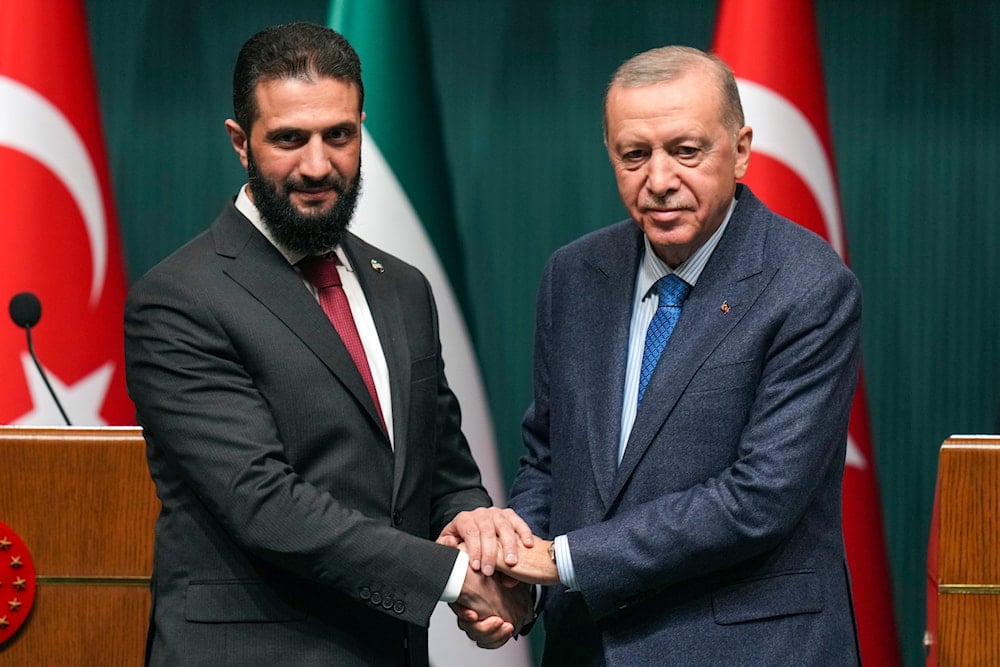Israeli-Turkish talks on Syria a sort of Sykes-Picot: Israeli media
Israeli media discuss the current talks between "Israel" and Turkey, showing a clear intention to keep Syria divided for the benefit of both countries.
-

Turkish President Recep Tayyip Erdogan, right, shakes hands with Syria's interim President Ahmad al-Sharaa during a joint press conference following their meeting at the presidential palace in Ankara, Turkey, February 4, 2025. (AP)
"Israeli media has discussed the talks between "Israel" and Turkiye in Azerbaijan regarding Syria, suggesting a potential geographic division of the country reminiscent of the Sykes-Picot treaty.
"Israel" has reportedly made it unequivocally clear that any shift in foreign troop deployments in Syria—particularly the establishment of Turkish military bases near Palmyra—would cross a red line and fundamentally alter the status quo, according to a report by Channel 13.
The concern, as per Channel 13, is that "Israel" could find itself forced to coordinate operations and provide advance notifications to Turkey, replacing the current dynamic it has with Russia, adding that Ankara must remain within its designated "security belt" in northern Syria and avoid any advance toward the Damascus-Suwayda line.
While Ankara seeks to consolidate control over Syria under Hay’at Tahrir al-Sham (HTS) leadership, it has no desire for direct confrontation with "Israel"; however, both sides share an interest in reaching an understanding—"despite the intensely toxic rhetoric between them."
A modern-day Sykes-Picot deal
"We are not seeking a confrontation with Turkiye, but we have made it clear that establishing military bases in Syria is unacceptable," Israeli Cabinet member Eli Cohen stated, adding that the Israeli delegation in the Azerbaijan talks aims to reach an agreement while preserving the status quo.
"What we're seeing here is that Israel and Turkiye have apparently reached an agreement about dividing Syria - it's a sort of Sykes-Picot deal between us and Turkiye," said former Navy Commander Eli Marom.
"Syria will no longer remain the same state - it will stay divided," Marom added, noting that "The Turks have interests in one part of this divided state. They're worried about the Kurds west of the Euphrates and want them moved east of the river. This is significant - it amounts to a modern-day Sykes-Picot arrangement between us and Turkiye in recent years."
Channel 12 noted that Turkish President Recep Tayyip Erdogan seeks a role in the new Syria, though without immediate plans for occupation, focusing instead on influence.
In a similar context, an Israeli source involved in the Azerbaijan negotiations told Israel News that "The talks were a positive first step, but it's still far too early to gauge Turkiye's responsiveness to "Israel"'s demands."
Parallel to the talks, Channel 11 reported that the Israeli aircraft transporting the delegation to Azerbaijan for negotiations with Turkish representatives was forced to take a detour after Turkey refused to grant airspace access to the Israeli Air Force Boeing 707, despite the presence of senior officials onboard
The channel described this as a "deeply undiplomatic move" that compelled the plane to reroute through Greek and Hungarian airspace over the Black Sea.

 3 Min Read
3 Min Read










